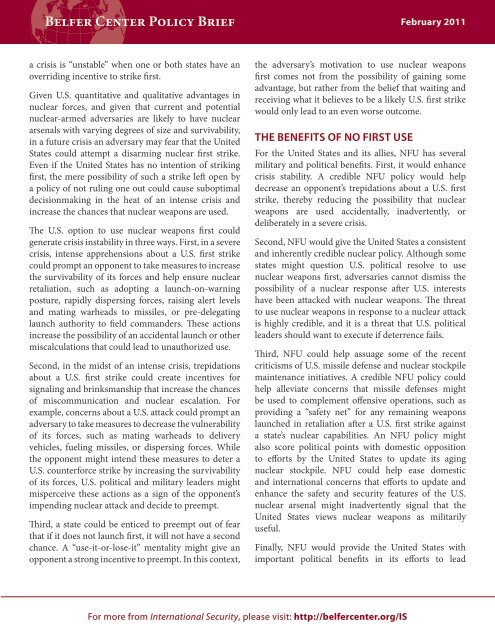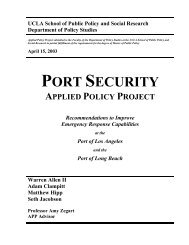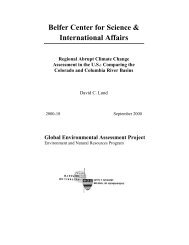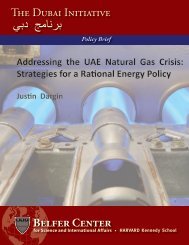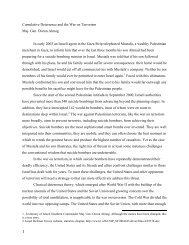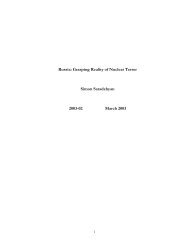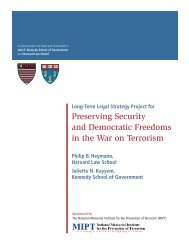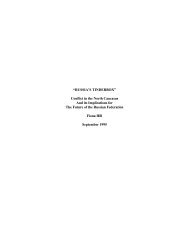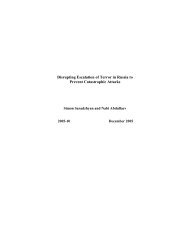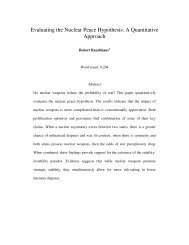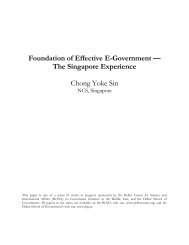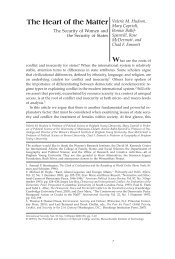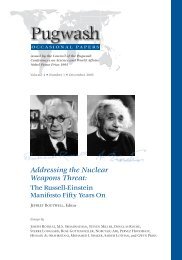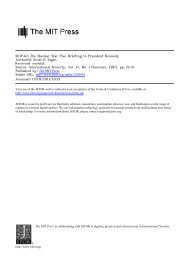The Future of U.S. Nuclear Policy: The Case for No First Use
The Future of U.S. Nuclear Policy: The Case for No First Use
The Future of U.S. Nuclear Policy: The Case for No First Use
You also want an ePaper? Increase the reach of your titles
YUMPU automatically turns print PDFs into web optimized ePapers that Google loves.
a crisis is “unstable” when one or both states have an<br />
overriding incentive to strike first.<br />
Given U.S. quantitative and qualitative advantages in<br />
nuclear <strong>for</strong>ces, and given that current and potential<br />
nuclear-armed adversaries are likely to have nuclear<br />
arsenals with varying degrees <strong>of</strong> size and survivability,<br />
in a future crisis an adversary may fear that the United<br />
States could attempt a disarming nuclear first strike.<br />
Even if the United States has no intention <strong>of</strong> striking<br />
first, the mere possibility <strong>of</strong> such a strike left open by<br />
a policy <strong>of</strong> not ruling one out could cause suboptimal<br />
decisionmaking in the heat <strong>of</strong> an intense crisis and<br />
increase the chances that nuclear weapons are used.<br />
<strong>The</strong> U.S. option to use nuclear weapons first could<br />
generate crisis instability in three ways. <strong>First</strong>, in a severe<br />
crisis, intense apprehensions about a U.S. first strike<br />
could prompt an opponent to take measures to increase<br />
the survivability <strong>of</strong> its <strong>for</strong>ces and help ensure nuclear<br />
retaliation, such as adopting a launch-on-warning<br />
posture, rapidly dispersing <strong>for</strong>ces, raising alert levels<br />
and mating warheads to missiles, or pre-delegating<br />
launch authority to field commanders. <strong>The</strong>se actions<br />
increase the possibility <strong>of</strong> an accidental launch or other<br />
miscalculations that could lead to unauthorized use.<br />
Second, in the midst <strong>of</strong> an intense crisis, trepidations<br />
about a U.S. first strike could create incentives <strong>for</strong><br />
signaling and brinksmanship that increase the chances<br />
<strong>of</strong> miscommunication and nuclear escalation. For<br />
example, concerns about a U.S. attack could prompt an<br />
adversary to take measures to decrease the vulnerability<br />
<strong>of</strong> its <strong>for</strong>ces, such as mating warheads to delivery<br />
vehicles, fueling missiles, or dispersing <strong>for</strong>ces. While<br />
the opponent might intend these measures to deter a<br />
U.S. counter<strong>for</strong>ce strike by increasing the survivability<br />
<strong>of</strong> its <strong>for</strong>ces, U.S. political and military leaders might<br />
misperceive these actions as a sign <strong>of</strong> the opponent’s<br />
impending nuclear attack and decide to preempt.<br />
Third, a state could be enticed to preempt out <strong>of</strong> fear<br />
that if it does not launch first, it will not have a second<br />
chance. A “use-it-or-lose-it” mentality might give an<br />
opponent a strong incentive to preempt. In this context,<br />
For more from International Security, please visit: http://belfercenter.org/IS<br />
February 2011<br />
the adversary’s motivation to use nuclear weapons<br />
first comes not from the possibility <strong>of</strong> gaining some<br />
advantage, but rather from the belief that waiting and<br />
receiving what it believes to be a likely U.S. first strike<br />
would only lead to an even worse outcome.<br />
THE BENEFITS OF NO FIRST USE<br />
For the United States and its allies, NFU has several<br />
military and political benefits. <strong>First</strong>, it would enhance<br />
crisis stability. A credible NFU policy would help<br />
decrease an opponent’s trepidations about a U.S. first<br />
strike, thereby reducing the possibility that nuclear<br />
weapons are used accidentally, inadvertently, or<br />
deliberately in a severe crisis.<br />
Second, NFU would give the United States a consistent<br />
and inherently credible nuclear policy. Although some<br />
states might question U.S. political resolve to use<br />
nuclear weapons first, adversaries cannot dismiss the<br />
possibility <strong>of</strong> a nuclear response after U.S. interests<br />
have been attacked with nuclear weapons. <strong>The</strong> threat<br />
to use nuclear weapons in response to a nuclear attack<br />
is highly credible, and it is a threat that U.S. political<br />
leaders should want to execute if deterrence fails.<br />
Third, NFU could help assuage some <strong>of</strong> the recent<br />
criticisms <strong>of</strong> U.S. missile defense and nuclear stockpile<br />
maintenance initiatives. A credible NFU policy could<br />
help alleviate concerns that missile defenses might<br />
be used to complement <strong>of</strong>fensive operations, such as<br />
providing a “safety net” <strong>for</strong> any remaining weapons<br />
launched in retaliation after a U.S. first strike against<br />
a state’s nuclear capabilities. An NFU policy might<br />
also score political points with domestic opposition<br />
to ef<strong>for</strong>ts by the United States to update its aging<br />
nuclear stockpile. NFU could help ease domestic<br />
and international concerns that ef<strong>for</strong>ts to update and<br />
enhance the safety and security features <strong>of</strong> the U.S.<br />
nuclear arsenal might inadvertently signal that the<br />
United States views nuclear weapons as militarily<br />
useful.<br />
Finally, NFU would provide the United States with<br />
important political benefits in its ef<strong>for</strong>ts to lead


